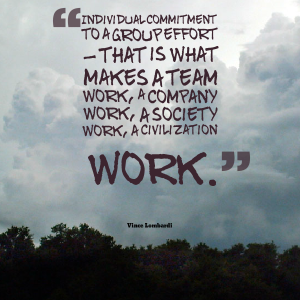 “I’m not interested in preserving the status quo; I want to overthrow it.” —Niccolo Machiavelli
“I’m not interested in preserving the status quo; I want to overthrow it.” —Niccolo Machiavelli
By Elizabeth Stincelli, DM
No one ever succeeded by simply maintaining the status quo. The key to success is to constantly be growing, be changing, and be improving. In order to do these things, you must learn to not only question, but as Niccolo Machiavelli stated, overthrow the status quo. Here are four things you can do to get started.
New questions
One of the most obvious ways to overthrow the status quo is to start asking new questions. Ask questions about yourself, about your team, about your processes, about your goals, about the marketplace, and about your competition. Asking new questions helps keep you from falling into unproductive habits. Ask questions of others; encourage honest answers. Ask about plans and projects. Ask about the organization. Why do we do things this way? Does it work? Is there a better approach?
New people
You must understand that your own biases drive the way you view situations and the decisions that you make. To overthrow the status quo, try surrounding yourself with new people, the right people who can help you see through your biases. Build new relationships and get other people involved. Build yourself a team of subject matter experts and then learn to rely on their expert advice.
New information
You can’t know everything. To overthrow the status quo, embrace curiosity and learning as part of your daily routine. Seek out new and valuable information, not just what you want to hear or information that substantiates what you already believe. Evaluate your failures and mistakes. What can you learn from them? What new information do they provide you with?
New point-of-view
The world we work in is changing at breakneck speeds. In order to remain competitive, you must learn to look at situations from a new point-of-view. You must learn how to have a perspective that is fluid and flexible. A fixed position will no longer serve anyone’s best interest. Use a new vantage point to help overthrow the status quo.
Overthrow the Status Quo
Don’t default to the status quo; it won’t address the challenges to success that you will face. Use new questions, people, information, and points-of-view to reexamine situation, goals, processes, and ways of thinking. It’s a new world, one in which the environment you are operating in is changing fast. If you want to keep up, overthrow the status quo.
© 2015 Elizabeth Stincelli
Liz Stincelli is passionate about recognizing and inspiring the leader in each of us. She is the CEO of Stincelli Advisors where she focuses on helping organizations engage employees and improve organizational culture. Liz holds a Doctor of Management degree with an emphasis on organizational leadership.
Learn more about Liz by visiting her website, stincelliadvisors.com and connect with her on Twitter @infinitestin, Google+, and LinkedIn. You can contact her by email at stincelliadvisors@gmail.com.





